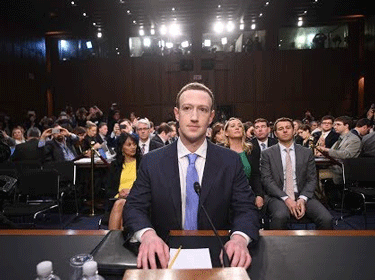The threat to Facebook’s survival will come not from its many past missteps, but from mistakes to come that may spell disaster. Center director Jeffrey Cole explains.
______________________________
By Jeffrey Cole
Long before we realized how little Facebook did to protect its users’ privacy, and how its top executives cared only about protecting their own reputations and self-created myths, there were already weaknesses in the Facebook story.
 These weaknesses had to do with the nature of social networks and the audiences that were drawn to them– especially teenagers.
These weaknesses had to do with the nature of social networks and the audiences that were drawn to them– especially teenagers.
Even before Facebook, we had seen that to a teenager, a social network is like a nightclub. When the uncool kids start showing up or the club becomes too crowded, they are out of there. This is especially true when their parents show up.
We began talking about this phenomenon in 2005 -– first with MySpace and later with Facebook in 2008. We have seen teens migrate from Facebook to Tumblr to Snapchat, and the process will continue. (See my previous column on Facebook.) Facebook fought us on this analysis, but within a few years could no longer hide the loss of teen users. This is not mismanagement on their part, but just the nature of networks and their audiences. Yet, it was a small crack in Facebook’s monolithic façade.
Some of the first significant research on Facebook came from the company itself: its studies misled users with false news feeds (the early signs of lack of regard for users was present eight years ago) to conduct inappropriate but fascinating research showing that users could get depressed looking at Facebook. Facebook found that by looking only at the good parts of life that others post (awards, travel, and events), it seemed that everyone else led more exciting lives. As a result, some users reported depression just by looking at Facebook.
______________________________________________________________________________________________
Recently, journalists, governments, critics, investors, and others have been asking if Facebook can survive. Now, a more serious question is being asked that shows the existential threat Facebook is facing: should Facebook survive?
_______________________________________________________________________________________________
In the last few years, Facebook had become perhaps the most important aspect of internet addiction. Like a drug that gets you hooked so you keep wanting more, Facebook users needed a “hit” of likes for the things they posted. Some of the early founders of Facebook came to rebel against what they had helped Mark Zuckerberg create, and went on to create software programs and websites to deal with Facebook addiction.
The issues I’ve described, while serious, are not unique to Facebook; they are also problems encountered by other online communities. But Facebook received the most attention, because it had 2.2 billion users and attracted everyone from teens to grandparents.
The threat to Facebook’s existence comes not from past problems; but from the future impact of a unique blend of arrogance, hubris, greed, mismanagement, and incompetence:
1) 2016 Presidential Election — while some have made a case that fraud and “fake news” on Facebook may have tilted the 2016 election to Trump, that charge cannot be proved definitively. What we do know is that millions of users thought they were reading posts from fellow American users when they were actually looking at content created in Russia intended to throw chaos and confusion into the election.
Facebook had no interest in policing the content posted on its site– even though it contained erroneous or dangerous information. This lack of attention and focus on profits created an open invitation to Russian hackers and government agents to come onto Facebook and sow confusion. Facebook happily opened the door to them.
2) Refusal to cooperate with investigations — after the narrowly-decided election, American intelligence agencies uncovered the truth of the Russian hacking into Facebook, as well as on YouTube and Twitter. When Congress convened hearings, they invited Facebook, Google and Twitter to testify. None of the CEOs or COOs would appear in Washington; instead, they sent their government relations representatives. This refusal to cooperate was seen as arrogance about Congress’s mandate to investigate what may have affected the outcome of a presidential election.
One would expect that two of the most successful companies on Earth (plus Twitter) to have experienced, capable, and responsive government relations executives. The representatives who showed up on Capitol Hill to speak for Facebook, Google, and Twitter reflected their companies’ arrogance. They answered most questions with some variation on “we’ll have to look into that.”
3) Will the check clear? Facebook has become an advertising monster: one holding company estimates that over the course of 16 years, 40 percent of advertising was sucked out of television, radio, newspapers and magazines and went to two places: Facebook and Google. Advertising turned Facebook into one of the world’s largest companies, and, for a while, Mark Zuckerberg into the third richest man in the world.
What became clear is that Facebook would accept advertising from anyone, regardless of where the money came from or what was advertised. There were no policies (that were enforced) that applied standards for the company’s actions. The only criteria that mattered was: did the check clear?
In February of 2018, Keith Weed, the then CMO of Unilever, delivered a keynote at the IAB Annual Leadership Conference. If, Weed threatened, Facebook didn’t ensure that Unilever ads did not appear on sites with hate speech, racism, or terrorism, then he would pull every advertising dollar out of the social network. Speaking as the world’s second biggest advertiser (after P&G), he finally got Facebook’s attention. Good corporate citizenship or conscience had no effect on Facebook: only the loss of significant revenue.
4) Cambridge Analytica — in March 2018, it was revealed that Cambridge Analytica, a political data firm working on conservative campaigns, had obtained the personal data of 87 million Facebook users, most of them in the United States. Facebook users, finally, demonstrated outrage and demanded answers. However, Facebook’s two top executives, Mark Zuckerberg and Sheryl Sandberg, were nowhere to be seen– even on their own Facebook pages!
Both Zuckerberg and Sandberg were happy to be in the spotlight when they were building their own personal brands as a boy genius and the working woman’s best friend. But when the going got tough, they retreated and showed no leadership or accountability. The absence of direction from the top was clear: in a matter of days, Facebook lost more than $100 billion in value, and Congress demanded answers. Finally, Zuckerberg had no choice but to testify. While he performed better than his government representatives, he hardly helped the company or served his users.
5) It gets worse (hard to believe) — in the past ten days, the British government released new information, including emails between Zuckerberg and Sandberg, that demonstrated Facebook was constructed and run purely as a money machine. The documents showed that Facebook was willing to offer special access to user data for big customers like Lyft or Netflix, but not to other, smaller companies.
The emails made it clear that neither Zuckerberg nor Sandberg had any concerns about their users’ data being compromised. Sandberg approved PR campaigns run by unseemly sources to discredit Facebook’s critics. It was Facebook going to war with the dirtiest tools they possessed. Suddenly, the leadership’s carefully constructed façade had been ripped apart.
These are just some of the highlights of the self-inflicted wounds of Facebook. Recently, journalists, governments, critics, investors, and others have been asking if Facebook can survive.
Now, a more serious question is being asked that shows the existential threat Facebook is facing: should Facebook survive?
In the last part of this three-column series, I will examine if it is possible for Facebook to rebuild the trust of its users.
____________

Jeffrey Cole is the founder and director of The Center for the Digital Future at USC Annenberg.
See all columns from the center.
December 12, 2018

